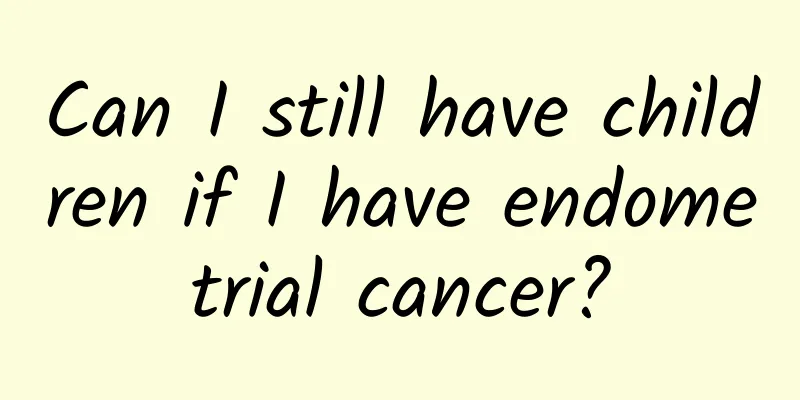Can I still have children if I have endometrial cancer?

|
This is the 4219th article of Da Yi Xiao Hu In today's society, with the rapid economic development and the continuous improvement of living standards, more and more women choose to marry and have children later, which leads to a series of follow-up problems, such as: Once a woman suffers from endometrial cancer and has not completed childbearing, can she retain her fertility? In recent years, treatment to preserve fertility has received more and more clinical attention and has become an important part that must be considered in the treatment of gynecological tumors. In what cases can we preserve the fertility of patients with endometrial cancer? How to develop a personalized treatment plan to preserve fertility? Generally, it is mainly based on a comprehensive assessment of the patient's age, strong fertility requirements, pathological type, clinical stage, and progression or remission of the disease during fertility preservation treatment. Currently, large-dose, high-efficiency progesterone treatment is mainly used. 1. Which patients are suitable for fertility preservation treatment? 1. Age ≤ 40 years old; 2. Have a strong desire to have children; 3. The pathological type is endometrial adenocarcinoma; 4. The degree of pathological differentiation is high differentiation; 5. The lesion is confined to the endometrium, without myometrial invasion, extrauterine spread, or lymph node involvement; 6. Positive expression of progesterone receptor (applicable to those receiving progesterone therapy); 7. The patient has no contraindications to progestin therapy (applicable to progestin therapy); 8. The patient has given full informed consent and is able to comply with treatment and follow-up. What are the methods for preserving fertility in the treatment of endometrial cancer? 1. High-dose, highly effective progesterone therapy Take medroxyprogesterone tablets or megestrol tablets orally continuously, observe whether there is vaginal bleeding during treatment, regularly check the changes in endometrial thickness by transvaginal ultrasound, and adjust the drug dosage in time; 2. Surgical treatment For localized endometrial lesions, they can be removed under hysteroscopy, and subsequent treatment can be given with high doses of highly effective progestins after surgery. 3. For patients with contraindications to progestin therapy such as obesity and abnormal liver function, the following methods can be selected 1) Gonadotropin-releasing hormone agonist (GnRHa); 2) Levonorgestrel-releasing intrauterine system (Mirena); 3) Aromatase inhibitors (such as letrozole, etc.). These methods are rarely used alone, but are often used in combination. 4. Comprehensive treatment Health education, diet control, exercise guidance, weight loss and lipid reduction, diagnosis and treatment of diabetes. III. How to evaluate efficacy, timing and methods of evaluation One course of treatment is 3 months of continuous drug treatment. Color Doppler ultrasound or (and) pelvic magnetic resonance imaging is performed routinely every 3 months to evaluate the size of the uterus, endometrial thickness, the presence of myometrial infiltration and extrauterine spread, and to understand the condition of other organs in the pelvic and abdominal cavity. Hysteroscopy, biopsy or diagnostic curettage is performed to obtain endometrial tissue for pathological examination to evaluate the treatment effect. When to stop drug treatment 1. Disease progression : There is definite evidence of myometrial invasion or extrauterine involvement; 2. Complete remission : Patients who have achieved complete remission after efficacy evaluation can stop treatment or continue consolidation treatment for one course depending on the specific situation; 3. No response to treatment : The tumor has no response to treatment after 6 months of continuous treatment; 4. During the treatment, the patient expressed that he no longer required to preserve his fertility; 5. Severe side effects occur and treatment cannot be continued. 5. Is follow-up treatment needed after tumor treatment is completed? After the tumor treatment is completed, follow-up treatment and regular check-ups are still required. The treatment for those who do not have any fertility requirements for the time being is to maintain regular menstruation and prevent recurrence; the treatment for those who urgently want to have children is to monitor ovulation and actively assist pregnancy; for those with postpartum tumor recurrence, total hysterectomy is recommended. It is worth emphasizing that although fertility-preserving treatment for endometrial cancer creates opportunities for patients to have children, it does not guarantee subsequent fertility and there are certain risks. Before treatment, a comprehensive assessment of the pros and cons and risks is required and a careful choice should be made. After treatment, changes in the condition need to be closely monitored. For those who cannot be relieved or whose disease progresses, radical surgical treatment should be performed in a timely manner. Author: Department of Gynecology, Huadong Hospital, Fudan University Zhu LihongDeputy Chief Physician |
Recommend
How long does it take for menstruation to be considered pregnant?
Women have their menstrual period once a month, w...
Is a single uterine fibroid considered a uterine fibroid?
Many women know about uterine fibroids, but when ...
How long does it take to recover after a hidden miscarriage?
Hidden miscarriage is a miscarriage that occurs w...
Is it pregnancy if breasts get bigger?
Women often experience enlarged breasts after pre...
What's going on if there's a sore on my vulva that looks like an ulcer?
Ulcers will appear in the female vulva. This skin...
Does cervical cyst require surgery?
Cervical cyst, also known as Nabothian cyst in cl...
What questions are asked during a gynecological examination?
Nowadays, medical experts have been advocating th...
What to do if you are not pregnant and your progesterone level is low?
Many female friends will consider their own ferti...
Why are women's underwear always wet?
Almost every woman has experienced wet underwear ...
10 maintenance errors can cause women's death
1. Neglecting routine gynecological examinations ...
How to prevent fallopian tube spasm
Fallopian tube spasm is a very common symptom. Fo...
Second trimester temperature
A woman's body will undergo many changes afte...
What is normal female leucorrhea like?
Every physiological manifestation of women can re...
How soon can I wash my hair after a cesarean section?
Cesarean section is a relatively common method of...
Are there any pregnancy reactions in ectopic pregnancy? How to detect ectopic pregnancy in time?
Needless to say, the impact of ectopic pregnancy ...









